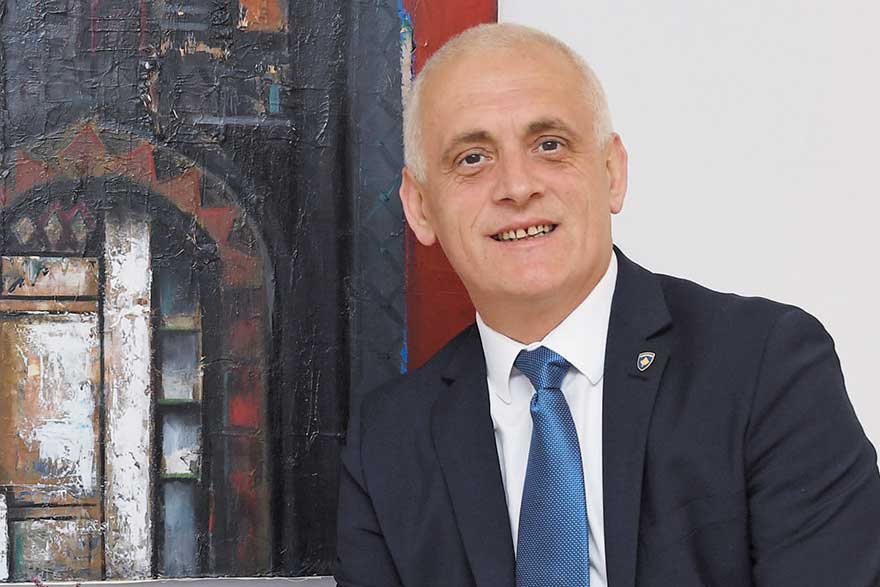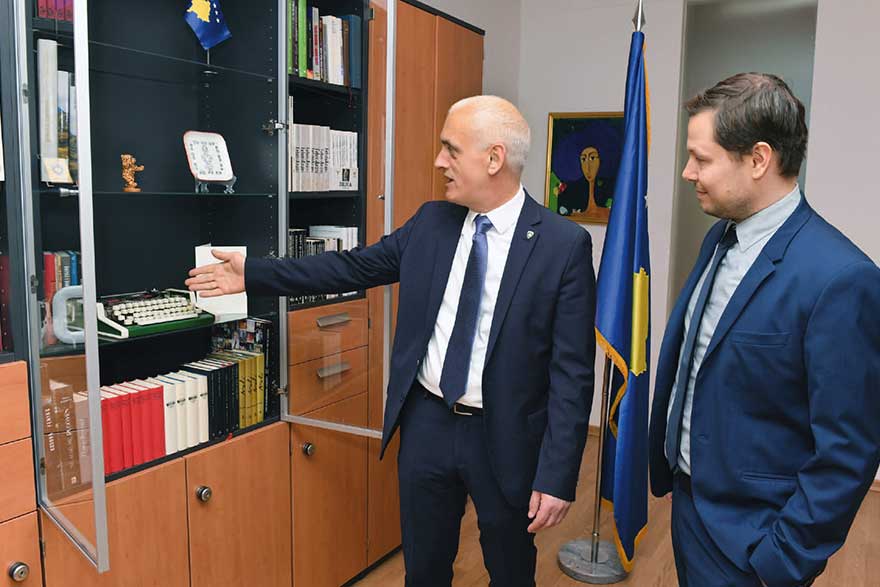As ambassador of a country ranked as one of the most optimistic in Europe, H. E. BEQË CUFAJ is positive about the future diplomatic and economic development of his country and the potential of its young population.
DM: Excellency, the 10th June marks the 20th anniversary of the end of the Kosovo War. After the end of the Bosnian War in December 1995, it was the last major battle on European soil. What is your perspective today looking back on this armed conflict, the roots of which can be traced back to the frequent territorial changes in the former Yugoslavia?
H.E. Beqë Cufaj: Many states emerged from the fall of Yugoslavia, including the Republic of Kosovo. The war, which lasted ten years, and the repression that came with it were a tragedy for us in the Western Balkan region. This calamity, which assumed a devastating scale, was like World War III for us. The 200 000 fatalities and the millions of refugees are the strongest evidence of the destructive force of the war machine of Slobodan Milosevic, the former Serbian president. Given this, it makes sense for me to compare our situation with the situation in Europe 20 years after World War II – post-war trauma, difficulties coming to terms with the past, the spirit of a new beginning. It is important for every Balkan nation to face up to the past. But the European Union should not see the Balkan people as a threat to the stability of Europe, but instead recognise their potential and accept them above all as part of the European family.
Kosovo was incorporated in the constitution of the Republic of Serbia as part of the country in 2003, and independence was finally achieved in 2008. Since then, your country has been considered a de facto state that is currently recognised by 116 of the 193 member states of the United Nations. How realistic do you think it is for full recognition, not to mention permission to join the EU, to be acquired in the upcoming years?
Serbia and its state authorities, institutions and people have long known that Kosovo is an independent state. I would call the rest ‘politics for internal use’. We are a new state that has been independent for 11 years and, as you already said, recognised by 116 member states of the UN. Full recognition and EU accession will happen. We’re working on it every day, there’s no going back! It’s not surprising that we continue to be ranked as one of the most optimistic nations in Europe. We have the youngest population and we’re one of the most beautiful countries in the Balkans! History has taught us not to forget the past, but at the same time to always keep looking forward.
Kosovo has now become a member of the International Monetary Fund (IMF), the World Bank Group and the European Bank for Reconstruction and Development. How does your government plan on continuing to gain international influence?
Unfortunately, there are still preconceived ideas about Kosovo. I’m referring to how Kosovo is still associated with war, crisis and corruption. But these are all in the past! Just the fact that we recorded an economic growth of 4.4 per cent in the last three years, and that the IMF forecasts the same for the next three years, indicates that we are in a much better position than many people assume. We even did very well in the regional comparison of the World Bank’s ‘Doing Business’ index. We are amongst the top ten countries to have implemented various reforms. We ranked 40th in the international comparison of countries. Of course we still have an image problem and we’re working hard to solve it, because it’s important to show our true self to the rest of the world. What we can offer is a small country with the biggest and most valuable mineral resources in Europe and young people who are full of hope in becoming part of Europe. You could actually say that they already are. Now the continent has to realise it.
Regional relations with Serbia and also with Bosnia and Herzegovina are still tense, while relations with other countries such as Albania have traditionally been good. What are your government’s plans for strengthening ties with its neighbouring states in the Balkans?
The Balkan states are closely interconnected. If we want to be part of the European community, we have to recognise and respect each other (and this applies particularly to Serbia). We already have the Western Balkan Process with the WB6 (editor’s note: the six Western Balkan countries: Serbia, Bosnia and Herzegovina, North Macedonia, Albania, Montenegro and Kosovo), which will have a determining influence on the entire integration of the region into the EU. The ongoing joint sessions and the projects of all the governments in the region show that a lot of work is being done so that one day there won’t be any borders in the Balkans. This will apply to both people and goods. Serbia should have realised this long ago, because there is no EU without accepting and implementing its values.
According to the German Eastern Business Association (OAOEV), Kosovo’s GDP grew last year by four per cent, which resulted from increased investments in the traffic infrastructure and higher net exports. How can this trend be maintained over the long term?
The assessment of the OAOEV corroborates the figures I mentioned earlier. We are taking on the challenge and going through with changing our image. If you look at the infrastructure of the country, especially the fact that there are barely any differences between urban and rural areas, there is hardly any other country in our region that is in a better position than the Republic of Kosovo. While this was achieved in part through the aid of the international community, the strong will of the Kosovan diaspora abroad was also a major factor. There are around 400 000 Kosovans in Germany, 200 000 in Switzerland and another 200 000 in other countries. Every year, 800 million euros flow into Kosovo. But what the country desperately needs now are investments and we have quite a lot to offer in this regard: a very good infrastructure, a young and highly motivated workforce and favourable legislative conditions.
In the 1970s and 1980s, Kosovo was well-known in Yugoslavia as a supplier of raw materials, such as brown coal, nickel, zinc and lead. What incentives does your government offer foreign companies today to invest in Kosovo?
The government of the Republic of Kosovo, under the leadership of His Excellency, Prime Minister Hashim Thaçi, commissioned a major American company, Contour-Global, to develop the biggest electricity supplier in the Western Balkan region. This will automatically bring us economic growth of more than six per cent in the next few years. There is plenty of coal and other mineral resources tucked away beneath the feet of the people of the Republic of Kosovo, enough to provide the country with a great deal of wealth in the upcoming years and decades if its inhabitants work hard. There were and still are many requests from serious stakeholders and investors to invest in Kosovo. But I believe that as soon as we have completed the power plant project and Serbia recognises the Republic of Kosovo, even more investors will take notice of Kosovo’s resources and become aware of the profitability this country has to offer.
Kosovo has a stunningly beautiful mountain scenery, the famous Mirusha waterfalls, and also a fantastic Islamic and orthodox architecture. The capital of Pristina is the cultural centre of the country. What else is there to see and which are the events that every visitor should attend to?
The country, the history – both the old and the new – are actually essential for those who would like to experience not only nature, but also a completely different kind of hospitality. Around half a million Germans, Americans, Italians, French and many other representatives of different nations who served in Kosovo can tell you about the everlasting beauty of the country. Kosovo offers breathtaking mountains, the Rugova Canyon, the Deravica mountain peak and the famous Sharr Mountains in the southwestern part of the country near the city of Prizren. If you wish to take in a fresh ocean breeze, the newly built motorway gets you to Albania in just two hours, where you can admire the Adriatic coast. Old monasteries, churches and mosques decorate the country. Prizren, the oldest city, welcomes filmmakers and cinephiles to its now world-famous ‘DokuFest’ film festival in the summer. Near the capital of Pristina there is a Roman city named Ulpiana, which attracts archaeologists from all over the world. And of course let’s not forget our Mediterranean cuisine and our wines that are sure to please every visitor!
You have been the ambassador to Germany since last year. Before that, you were a writer and a journalist working for the Frankfurter Allgemeine Zeitung (FAZ), Neue Zürcher Zeitung (NZZ) and Courrier International, among others. What vision do you have for your career – is your future in journalism or in diplomacy?
Once an author, always an author. Our culture is small. I mean, I used to be a kind of cultural ambassador, with my work as a journalist and especially as a belletrist. This background, and the experiences I gathered, have made my current position as an ambassador easier. However, I also feel that there are some major differences. For instance, the processes in diplomacy are much slower. And the responsibility that I now carry is totally different. In my current position, I no longer act as just an artist and a journalist but also as the representative of a country, one that is above all very young, and this brings challenges along with it that I take on every day with energy and enthusiasm. The line between journalism and diplomacy is blurred, and since I am passionate about both, I look toward the future with great confidence. After all, I have only been the Ambassador of the Republic of Kosovo for one year. I think it would be premature to define the differences so soon. When Bonn was still the capital of Germany at the end of the 1990s, I worked there as a journalist. Twenty years later, I am representing my country as an ambassador. In the future, I will continue to be fully committed to establishing even better bilateral relations between the Republic of Kosovo and the Federal Republic of Germany. The form might change, as it has in the past, but my goals will remain constant.
Kosovo Official name:Republic of Kosovo
Capital: Prishtinë/Priština
Area: 10 877 km²
Population: 1.9 million
Population density: 160 inhabitants per km²
Official languages: Albanian and Serbian
Government: Parliamentary democracy with unicameral parliament
Head of state: President Hashim Thaçi
Head of government: Prime Minister Ramush Haradinaj
National anthem: Evropa

